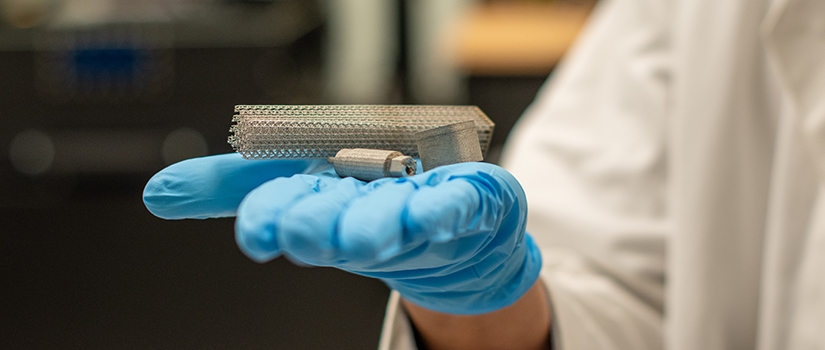Smart manufacturing techniques will improve performance of 3D printed metals used in South Carolina’s aerospace and medical industries
By Leigh Thomas | July 23, 2020
Additive manufacturing is a fast-growing technology that allows industries to produce complex, highly customized products. Its global market was valued at $9.3 billion in 2018, and it is used by many industries in South Carolina. The process is increasingly applied in the aerospace and medical industries, with strong expansion to the automotive industry and consumer goods market.
"This work benefits all of us, particularly if that part is going on an airplane.”
- Tressa Gardner, SiMT
However, additive manufacturing can be both time and cost-prohibitive due to the effort required to achieve optimal process parameters for quality fabrication. Lang Yuan and Austin Downey of the University of South Carolina College of Engineering and Computing, through a grant from the SC Research Authority, are developing “smart” additive manufacturing techniques that will achieve greater quality and performance of metal materials.
The team is developing a real-time control system designed to achieve desired material properties despite the fluctuations encountered during fabrication. The challenge with 3D printing of metallic parts is achieving uniform quality when printing products, for example, made up of varying thicknesses. A thin area of the part may experience different temperature history than a thicker area due to different heat transfer characteristics. Yuan is leading the team’s use of sensors and high-speed cameras to understand how these conditions vary at different locations of the material. Computational modeling will then simulate how the materials behave under different process parameters and determine what changes should be made at varying stages of the process.
“The current additive manufacturing process typically applies one set of process parameters across the entire part, which does not adapt to what truly occurs during the printing process," Yuan says. "By using smart additive manufacturing, we can identify inconsistencies in quality, change parameters where needed and in turn educate engineers on identifying these potential defects and correcting them on the fly.”
The grant awarded for this study is $100,000 for a one-year duration. Yuan is collaborating with the Southeast Institute of Manufacturing Technology (SiMT) at Florence-Darlington Technical College, which boasts the largest number of 3D prototyping machines and materials available in the Southeast. Yuan’s expertise lies in the understanding of the physical phenomena during the printing process and resulting material behaviors and properties of additively manufactured parts. Co-Investigator Austin Downey, an assistant professor at UofSC, will lend his expertise in machine learning algorithms that enable condition assessment and design of a real-time control system. Together, they will work to deliver a smart manufacturing system that will advance additive manufacturing technology in South Carolina.
SiMT Associate Vice President Tressa Gardner said, “This research helps us inform industries throughout South Carolina and work with them to build better products and materials. We can better understand the material properties and improve the integrity of a part, knowledge that is helpful to industries such as the Boeings of the world. This work benefits all of us, particularly if that part is going on an airplane.”
Downey is an assistant professor of mechanical engineering in the College of Engineering and Computing. His research focuses on real-time control of adaptive systems.
Yuan is an associate professor of mechanical engineering in the College of Engineering and Computing. His research focuses on understanding and controlling microstructure and defect formation during alloy solidification for additive manufacturing, casting, and remelting technologies.
